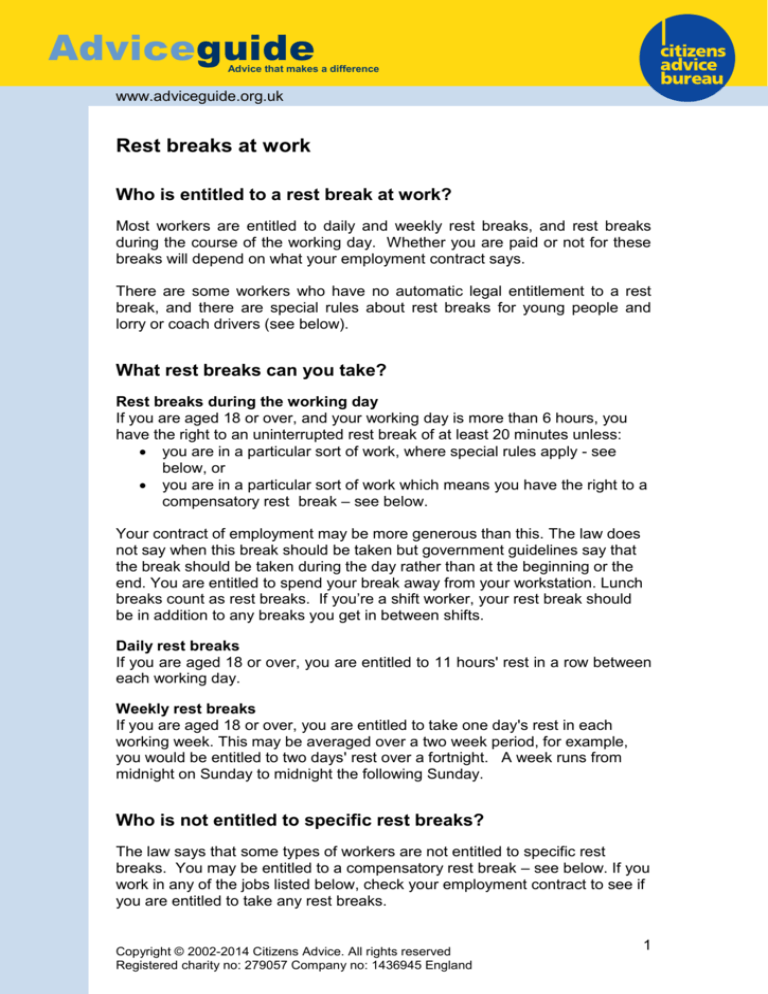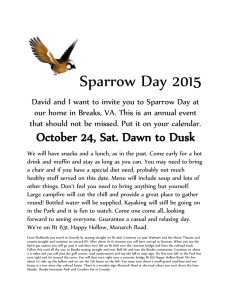
Adviceguide
Advice that makes a difference
www.adviceguide.org.uk
Rest breaks at work
Who is entitled to a rest break at work?
Most workers are entitled to daily and weekly rest breaks, and rest breaks
during the course of the working day. Whether you are paid or not for these
breaks will depend on what your employment contract says.
There are some workers who have no automatic legal entitlement to a rest
break, and there are special rules about rest breaks for young people and
lorry or coach drivers (see below).
What rest breaks can you take?
Rest breaks during the working day
If you are aged 18 or over, and your working day is more than 6 hours, you
have the right to an uninterrupted rest break of at least 20 minutes unless:
you are in a particular sort of work, where special rules apply - see
below, or
you are in a particular sort of work which means you have the right to a
compensatory rest break – see below.
Your contract of employment may be more generous than this. The law does
not say when this break should be taken but government guidelines say that
the break should be taken during the day rather than at the beginning or the
end. You are entitled to spend your break away from your workstation. Lunch
breaks count as rest breaks. If you’re a shift worker, your rest break should
be in addition to any breaks you get in between shifts.
Daily rest breaks
If you are aged 18 or over, you are entitled to 11 hours' rest in a row between
each working day.
Weekly rest breaks
If you are aged 18 or over, you are entitled to take one day's rest in each
working week. This may be averaged over a two week period, for example,
you would be entitled to two days' rest over a fortnight. A week runs from
midnight on Sunday to midnight the following Sunday.
Who is not entitled to specific rest breaks?
The law says that some types of workers are not entitled to specific rest
breaks. You may be entitled to a compensatory rest break – see below. If you
work in any of the jobs listed below, check your employment contract to see if
you are entitled to take any rest breaks.
Copyright © 2002-2014 Citizens Advice. All rights reserved
Registered charity no: 279057 Company no: 1436945 England
1
Adviceguide
Advice that makes a difference
www.adviceguide.org.uk
Workers who do not have an automatic legal right to rest breaks include:
couriers, employed taxi drivers and drivers of small goods vehicles.
These workers are entitled to ‘compensatory rest’ (see below) rather
than specific rest breaks
some rail workers. These workers are entitled to 'compensatory rest'
(see below) rather than specific rest breaks
some people working offshore in the oil and gas industries. Where their
workplace is far from their home, they are entitled to 'compensatory
rest' (see below)
members of the army, police and civil protection services
workers in certain industries such as security guards. These workers
are entitled to ‘compensatory rest’ (see below) rather than specific rest
breaks
There are separate rules for lorry, coach and heavy goods vehicle (HGV)
drivers - see below.
If you're a shift worker and can't take your rest break
If you're a shift worker and you've changed shift, or finished work in the
morning before your evening shift, it may not be possible to take your full rest
break before starting the new shift. In these circumstances, you should be
given a compensatory rest break (see below).
Compensatory rest breaks
If you don't have the right to specific rest breaks, or if you are a shift worker
and as a result you have to work during what would normally be a rest period,
you're still entitled to a rest period. This is called a compensatory rest break.
This means that you can take the break at a later time. It should be taken
within a reasonable time from when you missed the break and should last as
long as a specific rest break would have lasted.
If you have missed a rest break
If you've missed a rest break to which you are entitled, your employer must
make sure that there's no risk to your health and safety.
Rest breaks for young workers
If you are over school leaving age but under 18, the law says that you cannot
usually work more than eight hours per day or more than 40 hours per week.
You must have 12 hours rest between each working day and two rest days
per week. You are also entitled to a 30 minute rest break if you work for longer
Copyright © 2002-2014 Citizens Advice. All rights reserved
Registered charity no: 279057 Company no: 1436945 England
2
Adviceguide
Advice that makes a difference
www.adviceguide.org.uk
than four and a half hours. There are also limits on the hours you can work at
night. You cannot usually work between:
10pm and 6am, or if your contract says you must work after 10pm,
between 11pm and 7am. There are some exceptions for people who
work in hospitals, agriculture, retail work, hotels and catering, bakeries,
post/newspaper deliveries, or who work in connection with cultural,
artistic, sporting or advertising activities
midnight and 4am, except in exceptional circumstances.
If you're a young worker and are being made to work longer hours than you
should, you can get help from an experienced adviser (see Further help).
Rest breaks for coach and lorry drivers
If you drive a lorry over 3.5 tonnes or a coach carrying more than nine people
- including yourself - on national journeys, or nine people on international
journeys, you must not work more than an average of 48 hours a week. This
is averaged out over a 17-week period, with a maximum of 60 hours in any
one week. This limit does not apply to self-employed drivers.
The following additional rules on taking rest breaks when you are driving, also
apply:
after four and a half hours of driving, you must take a rest of 45 minutes
if you have been driving every day for six days, you must take a 24hour rest
you must not drive for more than 90 hours in a two-week period
you must have a daily rest break of 11 hours (which can be reduced to
nine hours up to three times in any week).
If your employer won't allow you to take a rest break
If your employer doesn't allow you to take the rest breaks you're entitled to,
you could ask to take the time off at a later time. A Human Resources officer
or trade union representative can help you do this. If talking to your employer
doesn't work, you could raise a written grievance. If you still need to take
matters further, you could make a claim to an employment tribunal. There's
a strict time limit for doing this. (see below). You should think carefully before
you make a claim as it could make relations with your employer worse, or put
your job at risk. You should get help from an experienced adviser.
If your employer dismisses you or makes you redundant because you
refuse to work through your rest breaks, you may be able to make a claim for
unfair dismissal to an employment tribunal. There are strict time limits for
doing this.
Copyright © 2002-2014 Citizens Advice. All rights reserved
Registered charity no: 279057 Company no: 1436945 England
3
Adviceguide
Advice that makes a difference
www.adviceguide.org.uk
Time limits for making a claim to an employment tribunal.
If you want to make a claim for the right to take rest breaks or for unfair
dismissal, you've usually only got three months minus one day from the last
time you were refused the right to take a rest break or from the date you were
dismissed. This time limit applies even if you're raising a grievance or
appealing against a decision. The Acas early conciliation scheme starts on 6
April 2014 and will apply to most employment tribunal claims. It affects the
time limit and is compulsory from 6 May 2014. You should get specialist
advice to help you work out the time limit for your claim.
Further help
Health and safety Executive
You can get further advice from the information line on 0845 345 0055 or from
the website at www.hse.gov.uk.
Lorry and coach drivers can get more information about their hours of work
from the Driver and Vehicle Standards Agency office. You can telephone them
on: 0300 123 9000, e-mail on: enquiries@vosa.gov.uk, or visit their website
at: www.gov.uk.
Information is also available in a TUC leaflet about holidays and rest breaks
that you can download from their website at: www.tuc.org.uk.
Citizens Advice Bureau
Citizens Advice Bureaux give free, confidential, impartial and independent
advice on a limitless range of subjects, including employment rights. They can
also refer you to a more specialist source of advice, if needed. To find your
nearest CAB, including those that give advice by e-mail, click on nearest CAB,
or look in your local telephone directory.
Other Citizens Advice fact sheets and leaflets which might help
Working hours
Resolving disputes at work
Time off work
Young people and
employment
This fact sheet is produced by Citizens Advice, an operating name of The National
Association of Citizens Advice Bureaux. It is intended to provide general information
only and should not be taken as a full statement of the law on the subject. This
information only applies to England, Wales and Scotland.
The fact sheet was last updated on 9 May 2014, and is reviewed regularly. If it is a
while since you got this fact sheet, please contact your local Citizens Advice Bureau to
check if it is still correct. Or visit our website - www.adviceguide.org.uk - where you
can download an up-to-date copy.
Copyright © 2002-2014 Citizens Advice. All rights reserved
Registered charity no: 279057 Company no: 1436945 England
4





